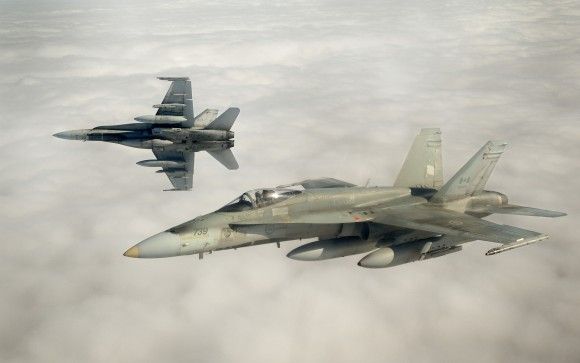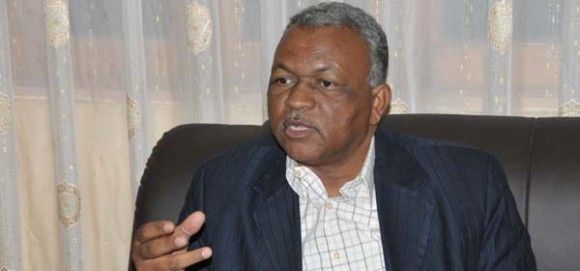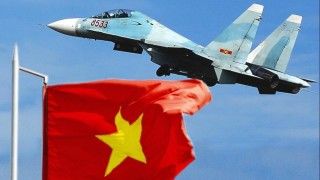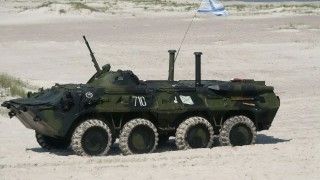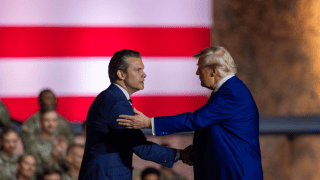- WIADOMOŚCI
- ANALIZA
Russia Is Going To Use Its Middle East Involvement Against NATO
Russian Minister of Foreign Affairs, Sergey Lavrov, criticized the steps taken by NATO, in order to provide reinforcement within the scope of the alliance’s presence in the East-Central Europe. This statement has been made at the time when Moscow started its involvement in the Middle East, fighting against the ISIS terrorists. Thus, it is plausible that getting “closer” to the West, as a result of the fight against the Islamic State, is going to be used by Kremlin against the East-Central European states.
Lavrov stated, in his interview for Radio Rossiya, that NATO breaches the 1997 Founding Act on Mutual Relations, Cooperation and Security between NATO and the Russian Federation signed in Paris, France. The breach has been, reportedly, committed by deploying equipment for the rotational elements across the East-Central Europe. Lavrov also accused NATO of using “tricks”, in order to camouflage the reinforcement of the regional forces. Russian Minister additionally claimed that the North Atlantic Treaty Organization is looking for a new enemy after the Afghan war ended. Sergey Lavrov also noted the fact that a “mutiny” took place in Ukraine.
Moscow, since some time now, has been expressing its critique against reinforcement of NATO military presence in the Central Eastern Europe, willing to divide the NATO member states within that scope, and imposing significant pressure onto the member states geographically located in the Western part of Europe. Such stance has been designed to limit the NATO’s decisiveness, when it comes to the reaction capacity within the context of sudden threats.
The aforementioned statement made by Lavrov constitutes only a repeated use of most of the Moscow’s charges against the North Atlantic Treaty Organization, that have been present in the public sphere for some time now. However, it is not an accident that the head of the Russian MFA made statements attacking NATO, right after the Paris terror acts, and right after the FSB determined, that the Russian Airbus airliner was downed due to a terrorist attack.
In the light of the above, we can clearly see that Russia is going to use the struggle against the IS as a pretext for warming up the economic relationship with the West, and for weakening NATO, which still remains one of the main long-term objectives pursued by Moscow, and still poses potential threat for the East-Central European states.
It is worth to mention the fact that US Army Chief of Staff, General Mark Milley, defined Russia as an “existential” threat for the United States in one of his interviews he gave back in November. Moreover, plans of additional reinforcement of the US Army units in Europe have also been revealed. Even though the plans did not assume that new, permanent bases are going to be created, realization of the NATO intentions would lead to a qualitative leap within the area of the US quick reaction capabilities in Europe. However, this would require consent on the part of the allies, including Germany. The German territory would, most probably, be the location where most of the equipment for the rotational units could be stationed.
We also know that NATO considers deployment of land forces’ battalions within the territory of the Baltic Republics. These units would be acting directly under the jurisdiction of the NATO command, which – most probably – is the reason for the Germany’s resistance towards such idea. Such solution would also reinforce the defence capabilities, particularly in case of Lithuania, Latvia and Estonia, making the potential military reaction a must, should these countries be in danger.
There are many signs suggesting that the recent Sinai act of terror is going to drive Russia towards undertaking significant actions against the IS, as a part of retaliation for killing the Russian citizens. Fighting against a “common enemy” does not mean that Moscow is going to resign from its long-term strategic plan, the aim of which is to weaken the North Atlantic Treaty Organization, making it impossible for the alliance to expand. Russia may even - in favourable circumstances – try to attack the NATO member states, which would lead to decrease of credibility of the alliance.
We may expect that the Russians, by using the recent act of terror in the Sinai Peninsula as a justification, making it possible to create a closer relationship with the West, would like to have impact on the public sphere through the circles that are traditionally in alliance with Moscow, including the radical political parties of Greece, French National Front or even some of the German Social Democrats. At the same time, playing the role of a victim of a terror act, and fighting against ISIS, would let Russia gain positive opinions in the mainstream, meaning that the general image of the country would get better. This is very important, especially after the Ukrainian aggression and after the incident of shooting down the Malaysian airliner took place.
NATO representatives should bear it in mind, that being in possession of own military strength, that may turn out to be indispensable, should any threats arise, does not contradict potential cooperation with Moscow, within some areas. Similar statements have been made by the NATO Secretary General, Jens Stoltenberg, stating that strong defensive stance is a basis, on which a constructive relationship with Russia may be created.
According to the NATO Secretary General, no contradiction exists between cooperation with Moscow and constructing own defence and deterrence system. NATO member states should actively act against the Russian propaganda, even if they are willing to cooperate with the Kremlin in the Middle East.
We should hope that the Ukrainian crisis, and the subsequent steps taken by Russia (including the simulated attacks targeted at the NATO member states or airspace violations) will be remembered by the decision makers, and they will treat these steps as a factor which is an indication of a possibility of emergence of an unexpected threat caused by the Kremlin authorities. This, on the other hand, shall have an impact on the decisions that are to be made during the NATO Summit in Warsaw, pertaining the expected reinforcement of the NATO presence in the East Central Europe. Some steps also need to be taken, in order to achieve a general increase of the NATO defensive capabilities (e.g. by increasing the level of defence spending in the individual member states).
Here, the decision makers of the countries located in the Central-East Europe may play a significant part, since this region – in a natural way – is facing relatively the greatest threat from Russia. A good example has been shown through a shared declaration made by the Baltic Republics, V4 Group, Bulgaria and Romania, pertaining the reinforcement of the allied defence capabilities, also in the Central-East Europe.
Read More: Andrzej Duda Attending a Summit Of The Central European States “Joint voice on NATO reinforcement”
British Think Defence website recently noted that in the light of the IS terror acts, Donbas and Riga are no longer a subject of the public interest. However, should NATO resign from the postulated means of strategic adaptation, consequences of such steps may be hard to predict. Russia may - should NATO be unable to reinforce its presence - feel encouraged to realize its strategic goal, to make an attempt at undermining the NATO’s credibility, by executing an attack against the NATO member states. Such situation would lead to a catastrophe, far beyond the scope of the effects caused by the contemporary terrorism (including the ISIS activities).













